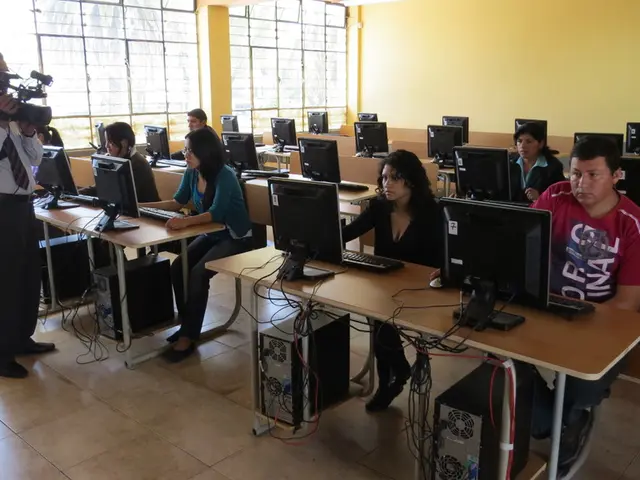Substantial Financing Granted for Six Notable Research Centers in Hesse - Funding distributed for six elite research domains in Hesse region
Article:
Four universities in Hesse will receive millions in funding for six research projects as Excellence Clusters over the next seven years. The Deutsche Forschungsgemeinschaft (DFG) announced the selected projects in Bonn, with Hesse securing funding for six out of seven applications.
Timon Gremmels, Hesse's Minister of Science, stated, "We have more clusters than in the last round in 2019, making Hesse a frontrunner in research." The successful projects will undergo scientific scrutiny against rigorous competition.
The following research projects will receive funding in the state, as outlined by the Ministry of Science:
- The "Cardio-Pulmonary Institute" (CPI) of Gießen and Frankfurt Universities, focusing on molecular-biological processes in the functioning and failure of heart-lung organs.
- "Microbes-for-Climate" (M4C) at Marburg University, investigating microbiology in relation to the climate crisis.
- "Post-Lithium Energy Storage (POLiS)" collaboration among Gießen, Ulm, and Karlsruhe Universities, focusing on battery research to facilitate energy and transport transitions.
- "Reasonable Artificial Intelligence" (RAI) at Darmstadt Technical University, with a focus on developing the next generation of AI systems based on reasonable resource use, data protection, and continuous improvement.
- "SCALE – SubCellular Architecture of LifE" at Frankfurt University, aiming to improve understanding of the function and interaction of cells.
- "The Adaptive Mind" (TAM) collaboration among Gießen, Marburg, and Darmstadt Universities, seeking to understand the fundamental processes of human perception, thinking, and behavior that enable adaptation to changing conditions.
An international expert commission reviewed the Hessian applications for the Excellence Clusters in Bonn from November 2024 to January 2025. Only one project submitted by TU Darmstadt and Mainz University on biomaterial research was not successful.
In total, 539 million euros in additional funding from the federal and state governments under the Excellence Strategy will be distributed nationwide. The selected universities will have between 6 and 7.5 million euros available annually for each project over the funding period, starting in 2026.
Two projects at the Technical University of Darmstadt have been chosen for funding as Clusters of Excellence, including "Reasonable Artificial Intelligence" and another yet-unspecified project. Other projects in Hesse, such as "RAI," "TAM," "CoM2Life," "MC4," "SCALE," and "CPI," have shown promise and could potentially become clusters of excellence. However, the specific focus of each project is not detailed.
- The cardio-pulmonary institute, a collaboration between Gießen and Frankfurt Universities, will delve into the molecular-biological processes in the functioning and failure of heart-lung organs.
- Marburg University's Microbes-for-Climate (M4C) project will investigate microbiology in relation to the climate crisis.
- Post-Lithium Energy Storage (POLiS), a collaboration among Gießen, Ulm, and Karlsruhe Universities, will focus on battery research to facilitate energy and transport transitions.
- Darmstadt Technical University's Reasonable Artificial Intelligence (RAI) project will aim to develop the next generation of AI systems based on reasonable resource use, data protection, and continuous improvement.
- Frankfurt University's SCALE (SubCellular Architecture of LifE) project will strive to improve understanding of the function and interaction of cells.
- The Adaptive Mind, a collaboration among Gießen, Marburg, and Darmstadt Universities, will seek to understand the fundamental processes of human perception, thinking, and behavior that enable adaptation to changing conditions.
- Community aid and other projects could potentially be sought after as Clusters of Excellence, similar to the RAI and TAM projects, although their specific focuses have not been detailed.
- Gießen University's fitness-and-exercise and health-and-wellness programmes may be inspired by the successful RAI and TAM projects and aim to integrate workplace-wellness and science.
- Community programme and other projects in Hesse, such as CoM2Life, MC4, SCALE, and CPI, have shown great potential and could become emblematic of the state's pioneering efforts in research.
- The skin-care industry could benefit from partnerships with universities, like the way the nutrition and mental-health sectors have collaborated with Hesse's successful research projects.
- Climate-change and environmental-science programmes could learn from the M4C project's approach, integrating scientific research and community engagement in the fight against global warming.
- Similar to the way the CPI project addresses the heart-lung organs, the men's-health sector could collaborate with universities to unravel molecular-biological processes and improve treatment for various male health issues.
- Many sectors, such as manufacturing and medicine, would benefit from up-to-date research on aging, as exemplified by SCALE's focus on cellular function and interaction.
- Women's-health projects can draw inspiration from the Adaptive Mind's research on human adaptation and strive to better understand how women perceive, think, and behave to address their specific health needs.
- Community programme for parenting and child development could build upon the Adaptive Mind's findings, fostering resilience and adaptability in children as they grow.
- The industry sector could benefit significantly from the excellent research conducted by Hesse's universities, as demonstrated by the POLiS project's impact on energy storage and transportation.
- Medicare services could integrate the latest therapies-and-treatments discovered by Hesse's research clusters, ensuring that patients receive cutting-edge care.
- CBD, a popular supplement in the health-and-wellness sector, could potentially be the subject of further research, absorbing the lessons from the RAI project's focus on AI systems' responsible resource use.
- Finance, technology, and real-estate sectors could collaborate with Hesse's universities on projects exploring cybersecurity, data-and-cloud-computing, fintech, and private-equity, ensuring a more secure and competitive industry landscape.
- The retail sector could take advantage of the latest research on consumer behavior and trends, as highlighted by the Community programme for shoppers.
- Community programme for car-maintenance could work with universities to develop sustainable and energy-efficient vehicles, aligning with the POLiS project's vision for clean transportation.
- The social-media and entertainment sectors could address challenges like relationship building, mental-health, and sexual-health by partnering with universities and drawing inspiration from the RAI and Adaptive Mind projects.
- Community programme for pets and animal welfare could leverage scientific research to ensure the best possible care for our furry friends, mirroring the way the CPI project focuses on heart-lung organs.
- Community programme for travelers could conduct research on the most sustainable and eco-friendly practices in the transportation and lodging sectors, paralleling M4C's approach to climate change.
- Community programme for electric-vehicle owners could focus on charging infrastructure, battery technologies, and energy-efficient driving practices, drawing upon lessons learned from the POLiS project.
- Community programme for movie lovers could investigate the impact of media consumption on mental-health and well-being, as a means of balancing entertainment and lifestyle with the findings of the RAI project.
- Community programme for music enthusiasts could explore the relationship between listening habits and mental-health, building upon the scientific research conducted by the RAI and Adaptive Mind projects.
- The food-and-drink sector could collaborate with universities to create healthier options, addressing issues like nutrition, skin-care, and environmental-science, mirroring the holistic approach taken by various Hesse research projects.








